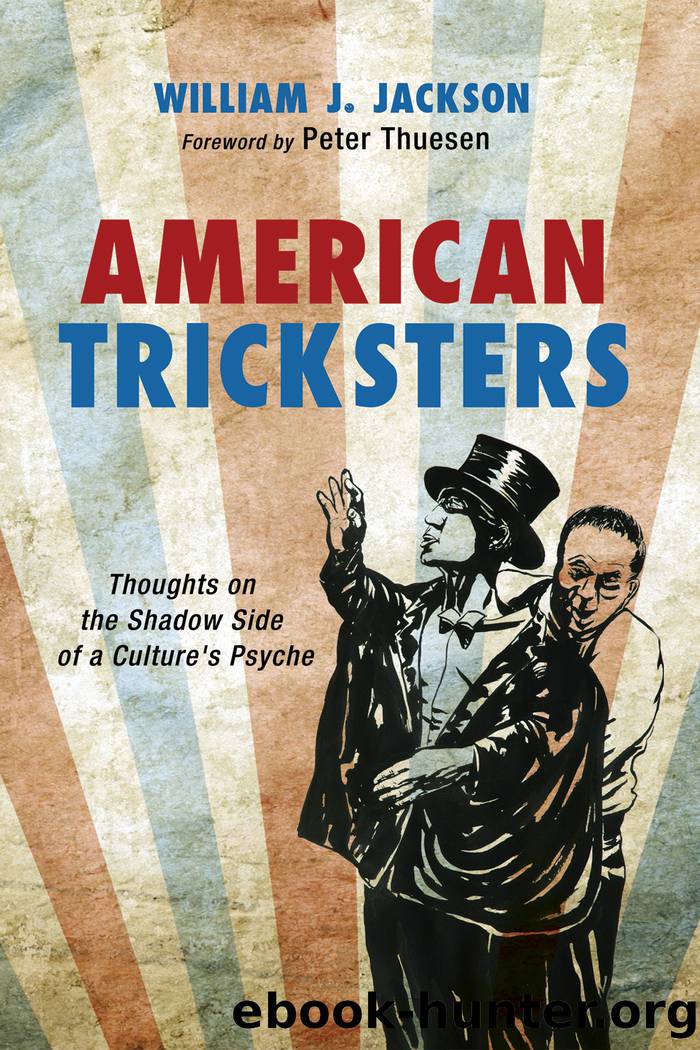American Tricksters by Jackson William J.;Thuesen Peter;

Author:Jackson, William J.;Thuesen, Peter;
Language: eng
Format: epub
ISBN: 9781630877330
Publisher: Wipf and Stock Publishers
Published: 2015-01-13T08:00:00+00:00
3
Tomorrow
Lessons We Need to Learn from Trickster
We are made up of falsehood, duplicity, inconsistency; and we hide and disguise these things from ourselves.
âBlaise Pascal255
What Soul Lessons Might Trickster Teach Us?
At first blush it may not be clear what useful roles might be played by tuning in to the dynamics of the trickster archetype in the psycheâs processes. Some may worry that paying attention to tricks might promote deception, fraud, instability, and disorderly conduct. I believe a wise awareness of the dynamics of the trickster archetype has a salutary effect and is useful for a variety of purposes. In traditional societies trickster stories have offered life-supportive functions. Sometimes trickster stories teach people about their limits, illustrating pitfalls to avoid, reminding them about the disastrous results of certain acts. With awareness of the mythic trickster there is an embrace of the psycheâs non-linear depth reality. Without any sense of the trickster archetype, there is some degree of humorless rigidityâno matter how soberly and responsibly one comports oneself, there is a flat dullness out of tune with life. Without appreciating tricksterâs shrewdness and gumption, one is victim to irrationality or one-sidedness of one sort or another. Experiencing trickster lessons is often no picnic, especially when it involves learning things the hard way; but that experience is a needed corrective to excessive naiveté.
Trickster is as trickster does. But what does trickster know? What knowledge does he embody? And what does knowledge of tricksters allow us to know? When there is soulfulness in the trickster it involves knowing about life, knowing the score, being seasoned and not green, not naive about lifeâs ways. James Baldwin observed in the 1960s that Europeans and African Americans often characterized Americans as children. Why? âAmericans have so little experienceâexperience referring not to what happens, but to whomâthat they have no key to the experiences of others.â256 I would add that we Americans often lack a sense of the interconnectedness of people, suffering from an illusory sense of isolated existences. Those who have a bent toward authoritarianism donât trust their own experiences; they arenât sure how to think for themselves. They crave the comforts of simplicity and would like to put up a âdo not disturb signâ on their doors. To have a blank slate and to lack caring when thinking of others is to be numb, unable to resonate with other humansâ lives. Experiences of living outside America and knowing the experiences of minorities inside America can add dimensions of understanding, as many former Peace Corp volunteers can attest. Lacking such dimensions makes one narrower, less able to know oneself and the rest of the world. The trickster traipses across borders, bridges gaps, wanders, and interacts; even his aimless acts end up linking realms together and revealing interconnections. The trickster teaches: âDonât take either trust or tricks for granted; appreciate the bonds of interrelations among us, and also know the play possible in the spaces between us.â
⢠⢠â¢
Inspirationsâdelicate outbursts of ideasâare sparked in our experiences. What inspires us?
Download
This site does not store any files on its server. We only index and link to content provided by other sites. Please contact the content providers to delete copyright contents if any and email us, we'll remove relevant links or contents immediately.
Cecilia; Or, Memoirs of an Heiress — Volume 1 by Fanny Burney(31353)
Cecilia; Or, Memoirs of an Heiress — Volume 3 by Fanny Burney(30951)
Cecilia; Or, Memoirs of an Heiress — Volume 2 by Fanny Burney(30908)
The Great Music City by Andrea Baker(21637)
We're Going to Need More Wine by Gabrielle Union(18088)
Bombshells: Glamour Girls of a Lifetime by Sullivan Steve(13120)
Pimp by Iceberg Slim(12949)
All the Missing Girls by Megan Miranda(12778)
Fifty Shades Freed by E L James(12465)
Talking to Strangers by Malcolm Gladwell(11910)
Norse Mythology by Gaiman Neil(11904)
Crazy Rich Asians by Kevin Kwan(8374)
Mindhunter: Inside the FBI's Elite Serial Crime Unit by John E. Douglas & Mark Olshaker(7851)
The Lost Art of Listening by Michael P. Nichols(6485)
Enlightenment Now: The Case for Reason, Science, Humanism, and Progress by Steven Pinker(6416)
Bad Blood by John Carreyrou(5784)
The Four Agreements by Don Miguel Ruiz(5534)
Weapons of Math Destruction by Cathy O'Neil(5049)
We Need to Talk by Celeste Headlee(4882)
